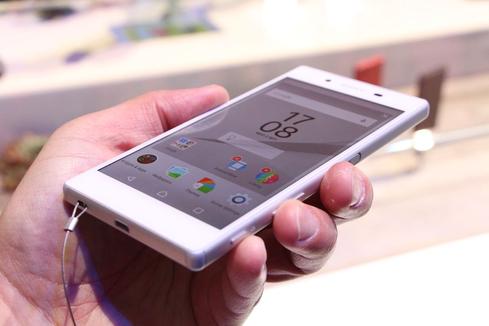BlackBerry Priv Will Be Company's First Android SmartphoneBlackBerry Priv Will Be Company's First Android Smartphone
Amid more losses, BlackBerry officially confirmed rumors that it's working on an Android-based smartphone. The Priv will be released later this year.


10 Best Smartphones, Wearables From IFA 2015
10 Best Smartphones, Wearables From IFA 2015 (Click image for larger view and slideshow.)
Beleaguered smartphone manufacturer BlackBerry announced that it would produce a handset running Google's Android operating system.
BlackBerry expects the device -- a new flagship slider design called the Priv -- to be available late in the calendar year in major markets both in-store and online. The company will release further details in the coming weeks.
BlackBerry will also continue to develop and enhance the BlackBerry 10 operating system. The company is confirming plans to release platform updates focused on security and privacy enhancements, with version 10.3.3 scheduled to be available in March of next year.
Photos of an Android-based BlackBerry smartphone leaked in late August. They showed a handset with BlackBerry's logo sporting a slide-out QWERTY keyboard.
There is also a roughly textured back battery cover and casing that could make the smartphone easier to hold, though whether this is the Priv or another as-yet unannounced smartphone offering remains to be seen.
The news came along with a disappointing second-quarter earnings report from the company that showed revenues from software and services down to $74 million for the latest quarter, compared with $137 million the company reported in the first quarter -- a drop of 47%.
With that as the background, BlackBerry announced its new path forward.
"Today, I am confirming our plans to launch Priv, an Android device named after BlackBerry's heritage and core mission of protecting our customers' privacy," BlackBerry CEO John Chen wrote in a Sept. 25 statement. "Priv combines the best of BlackBerry security and productivity with the expansive mobile application ecosystem available on the Android platform. From these initiatives, we anticipate modest sequential revenue growth in each of the remaining quarters of fiscal 2016."
Growing Through Acquisitions
On Sept. 4, BlackBerry announced it had acquired security specialist Good Technology for $425 million. That news could help BlackBerry build on their enterprise mobility management (EMM) value-added services.
The hope is that Good Technology will bring additional capabilities to BlackBerry, including secure application management and containerization that protects end-user privacy. (The majority of its activations have come from Apple iOS devices.)
The transaction is expected to close toward the end of the company's 2016 fiscal third quarter.
BlackBerry also drew attention to its acquisition of AtHoc, a provider of secure and networked crisis communications, for $250 million.
AtHoc's platform alerts any device -- including iOS, Android, PC and Mac desktops, digital displays, radios, IP phones, and endpoints such as sirens, fire panels, and speakers -- during crucial emergencies, such as natural disasters.
[Can Android save BlackBerry? information asks the question.]
The company will be part of BlackBerry's Internet of Things initiative. It is also involved with several government agencies.
"I am confident in our strategy and continued progress, highlighted by our fourth consecutive quarter of year-over-year double digit growth in software licensing revenue and sixth consecutive quarter of positive free cash flow," Chen said.
"In order to expand our leadership in cross platform software and services, we are investing strategically -- organically through new products and services based on the BES platform, and through acquisitions like AtHoc and Good. At the same time, we are focused on making faster progress to achieve profitability in our handset business," Chen added.
By the end of 2014, BlackBerry's share of the global mobile operating system market stood at only 0.4%, according to an IDC report from February. That number represented a decline of nearly 70% from that of 2013.
About the Author
You May Also Like






